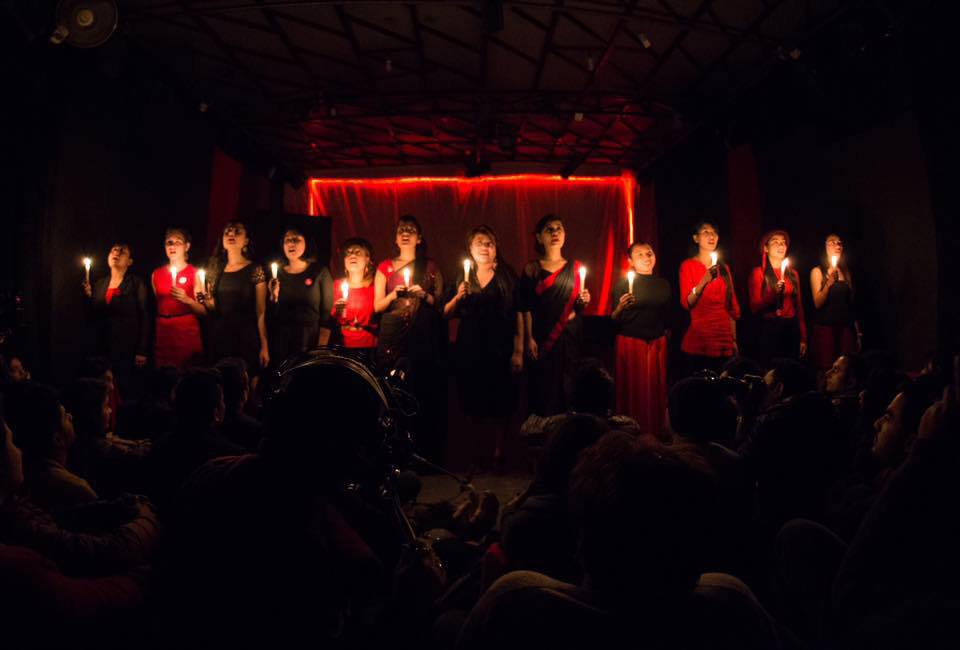Productions

We engage in intensive theatre processes with an aim to put up a production on stage.
Vagina Monologues
Katha Ghera has been producing the Vagina Monologues- योनीका कथाहरू in Nepali for the past three years. Written by Eve Ensler, the Vagina Monologues is a collection of stories of women and their diverse life experiences that touches upon the matters of abuse, violence, sex, love, as well as pleasure. Katha Ghera has been a part of the annual V-Day movement and pledges to keep sharing the stories of women until the violence against women completely stops.
The Vagina Monologues celebrates the identities of women and brings forward their unheard stories out to the world as a part of the global V- Day movement to end violence against women and girls. The Vagina Monologues is a core of the V- Day movement. This movement takes place worldwide each year starting from 1 February to 30 April. The monologues are based on these interviews and have been performed in more than 140 countries.
Katha Ghera's process of putting up the Vagina Monologues is special because it always begins with "Vagina Workshops" where the performers have a space to share their personal stories, ask questions and find answers. Additionally the workshop also carries in-depth and essential conversations surrounding sexual organs and processes that help the actors involved to thoroughly know about their own bodies and everything that happens to and around them. This process is vital to go through for each actor before getting into the nuances of the script.

Director’s Note
Katha Ghera's production of The Vagina Monologues is a theatrical adaptation of unheard stories related to female sexuality in English and Nepali. The stories help shed light into the often stigmatized and silenced voices of women that allow violence to overpower them. Sharing these stories every year is important as they are conversation starters that we hope will open doors for reflection and understanding. While preparing for the play we undergo introspective process that often enables self- discovery. This year’s production is a special fundraiser in order to sustain the practice of Playback Theatre to make itself surviving as it is a powerful medium to spread compassion and empathy that can be generated in people through storytelling and Theatre. The funds collected through this performance will be used to take Playback theatre outside the perimeters of Kathmandu and engage with people to share the power of this form. The journey of using art form of one kind to support an art form of another has enriched our lives with more purpose and meaning. We believe in the transparency, accountability and productivity of self-run initiatives run by passion and believe that genuine processes engender meaningful ripple effects.
Line
Five people queue up in a line. Waiting for what or who is never made clear but each of them is determined to get to the front and be first, nonetheless.. Using all kinds of stratagems to get ahead- some honest, some plainly clever, and some rather dubious- this static race to the top becomes a bleak metaphor of the times in which we live. And of the games we play with others and with ourselves as we teeter on the brink of chaos.
The play is a satirical comedy set in the Theatre of the absurd genre which pokes fun at the human state of nothingness. Katha Ghera's Nepali adaptation of line embraces colloquial Nepali language and employs Nepali nuances to highlight hypothetical instances one would use in order to get ahead in line, or life.
Director's Note
Human beings are beautiful, but also flawed. Sometimes in order to get ahead, people stoop so low that you begin to closely regard their intentions and motives. I stumbled upon this play when I was going through an overwhelming phase, and felt it was a relevant answer to all the times I had not been able to confront people who are skilled at manipulating any situation at their advantage. Through this play I channelize this negativity into something constructive. This timelessness makes it universal. I've tried to rid this play of all the class, gender, and caste based stereotypes in the best way I can.. The blatant sexism in the portrayal of Raveena's character in the original script was problematic for me, and incidentally for the playwright himself. In recent interviews, playwright Horovitz mentions how in today's times, he would change much in the play, in relation to her. In my own ways, I attempt to defy those stereotypes, but I do so without protecting Raveena under a sacred veil, and portray her in a way that her voice is heard and the essence of her character remains unaltered. Consequently, the characters are only a "presentation' in order to highlight a larger narrative, and not in any way, a 'representation'. I feel blessed to work with some of my favorite actors, who happen to be beautiful human beings; a special mention to Gunjan, who worked tirelessly in managing this production. I am grateful to the recent Director's workshop I was a part of, and to Bimal Subedi, who helped facilitate a discourse on ethics and political correctness. It has stirred both me, and the Line team.